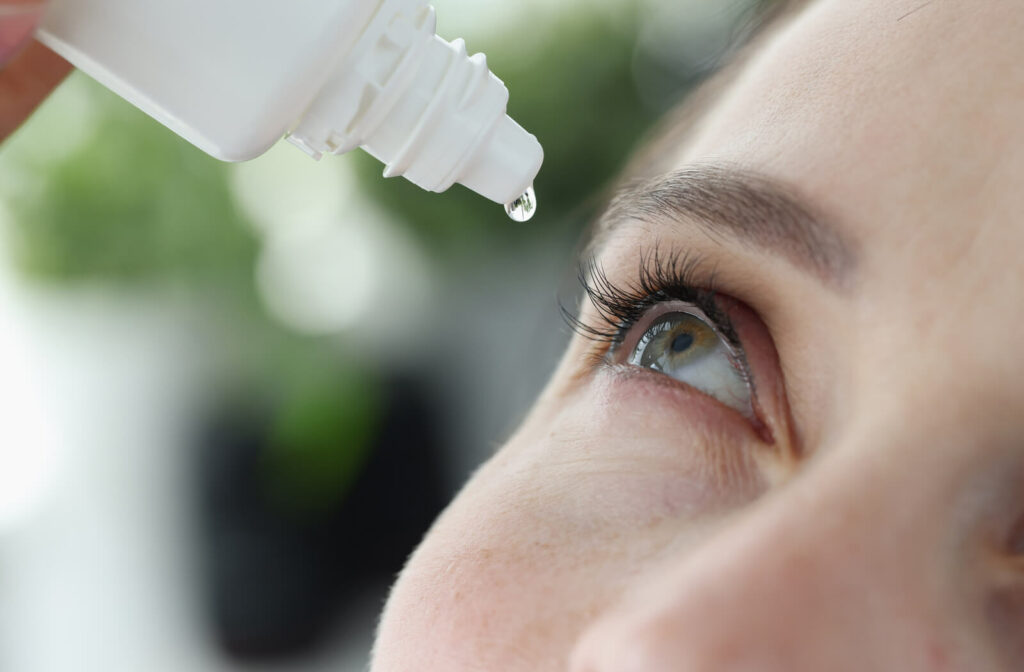Looking to buy Vuity Eye Drops?
Eye drops can treat various eye problems, from allergies to ocular diseases. Your optometrist may recommend eye drops to alleviate dry eye symptoms or prescribe antibiotic eye drops to treat an infection. There are plenty of options for finding the eye drops you need, but some one-of-a-kind eye drops are harder to find. Vuity eye drops by Allergan are the first and only eye drops FDA approved for presbyopia. As the product is relatively new, making it less common.
So, where can you buy Vuity, and how do you know it’s right for your eyes?
After an eye exam and determining if you are a good candidate for Vuity, the optometrists at Optical Illusions can prescribe Vuity eye drops to treat presbyopia.
What Is Presbyopia?
Vuity eye drops are used for correcting presbyopia, a vision condition caused by the natural aging of the eye lens. The lens is a transparent layer (behind the iris) that changes shape to reflect light. With presbyopia, the lens becomes less flexible and causes blurry near vision.
Problems with near-vision become more common as adults reach their mid-40s. However, changes to the eye lens begin in childhood. Presbyopia can occur in patients who’ve had life-long healthy vision, or it can happen alongside other refractive errors, including myopia, hyperopia, and astigmatism.
How Do Vuity Eye Drops Work?
The first eye drops for treating presbyopia, Vuity, made by Allergan, are the first eye drops for treating presbyopia. In addition, the eye drops are the first and only FDA-approved presbyopia drops. Although Vuity doesn’t cure the vision condition, it can improve vision quality.
Vuity eye drops are used daily (one drop per eye). Instead of directly affecting the eye lens, the drops reduce pupil size. Pupils change shape (widening or shrinking) to control how much light enters the eye. As a result, our pupils shrink when we need to see up close. Vuity eye drops cause the pupil to constrict (reduce size) to support near-vision.
Vuity eye drops can begin working as early as 15 minutes after application. They can effectively improve vision for up to 6 hours.
Who Can Benefit from Vuity?
Presbyopia, like any refractive error, is on a sliding scale. Some people with presbyopia may have some vision difficulties but don’t need reading glasses all the time. However, presbyopia can also significantly impact vision and may require patients to wear prescription lenses consistently. Additionally, lenses or surgery may not be an option for more severe presbyopia.
Vuity works best for people with low presbyopia. Patients with higher prescriptions or vision difficulties can still benefit but may not see the same results.
For example, if a patient wears reading glasses with a +1.00 prescription, they have a low prescription with few vision difficulties. On the other hand, a +4.25 would be a high prescription. So the first patient (+1.00 prescription) might use Vuity and be able to read the fine print on a label.
The second patient, with a higher prescription, may not be able to read the fine print after using Vuity. However, other close-distance objects may be clearer. For example, they may be able to reduce the font size on their phone or see the numbers on a price tag.

Can Anyone Use Vuity?
Anyone with presbyopia can benefit from Vuity, but not all patients are good candidates for the treatment. Although there are few contraindications, eye doctors are still cautious about prescribing Vuity for patients with additional vision problems.
For example, patients with high myopia (nearsightedness) are less likely to be good candidates. The main ingredient in Vuity, pilocarpine (also used to reduce eye pressure), can potentially cause adverse effects, including swelling.
High myopia and increased eye swelling are risk factors for retinal detachment. However, this problem is theoretical and wasn’t found in the medication trials.
Another concern is night driving. For patients that are more active at night, including jobs that require frequent driving, the effects can make night-vision difficult. Vuity prevents the pupils from dilating (widening), interfering with the ability to receive more light in dim or dark conditions.
Eye drops can be a convenient option, but they may not be an appropriate solution for all patients. The most common side effects are eye redness or headaches. However, it’s essential to keep your optometrist informed of any eye discomfort or changes so they can help protect your eye health.
Where Can You Buy Vuity?
Vuity eye drops are prescription-only, so the first step is seeing an optometrist or ophthalmologist. At your next eye exam, your optometrist can evaluate the health of your eyes, assess your prescription, and discuss your unique eye care needs. Then, they can use up-to-date information about your vision to determine if Vuity may benefit you.
If you’re a good candidate, your optometrist can prescribe Vuity eye drops and give you more information about where to find them. Vuity can be available through most pharmacies. However, as Vuity is still new, your chosen location may need time to order it. Vuity eye drops by Allergan are currently available by prescription nationwide.
Contact Us About Vuity
Contact us when you’re ready to discuss treatment options for presbyopia! We can help answer your questions about Vuity and determine if you’re a good candidate for presbyopia eye drops. Book an appointment today with Optical Illusions!



